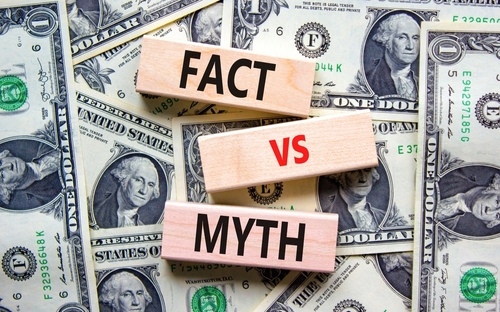The IRS reports that over 165 million returns were filed for the 2021 tax year. Despite so many people filing for taxes every year, tax myths persist. Tax laws and guidelines change yearly, and many details surrounding tax filing can become convoluted. Halter CPA hears many tax myths every year from people trying to file their taxes. Here, we will debunk four common tax myths and give you the facts.
Myth #1: Filing taxes is voluntary.
While this is one of the most straightforward tax myths to debunk, a surprising number of people believe that filing taxes is voluntary. This stems from the language used in Form 1040, which describes the tax system as “voluntary.” But this language does not exclude you from the responsibility of filing your taxes year to year. Instead, “voluntary” refers to the fact that each individual filer is responsible for determining the exact amount of taxes owed. Unless you are working through a legitimate dispute, you must file and pay taxes by tax day every year.
Myth #2: Money made online is tax-free.
It is easy to see how this myth began. With the influx of online shops and services, many people are getting their income through more non-traditional means online. And while this income is not reported for you, as it would be if you were working through an employer and filled out a W-9, you must still report it. To the IRS, income earned online is the same as income earned offline. So if you freelance, have an Etsy shop, sell goods or services through a website, etc., you must claim this income on your tax returns if you make more than $400 in a given tax year.
Myth #3: Students don’t have to pay taxes.
This is only half true. A student still dependent on someone else is not obligated to pay taxes as long as they earn less than $12,550 (for 2022) in that tax year. But, if the student made more than this, they must file taxes even if they depend on someone else. Keep in mind that even if you don’t HAVE to pay taxes, it could be in your best interest to do so. If your employer withheld money from your paychecks for tax purposes, you would likely get a refund.
Myth #4: My income is too low to qualify for an audit.
There is a 1% chance you will get audited if your income falls below $100k a year. While this isn’t a huge chance, it is a chance you shouldn’t take because the consequences can be severe. The IRS looks for specific red flags when determining whom they audit. An experienced tax professional will be able to help you avoid these red flags and keep a detailed record of your tax history to ensure a smooth process if you do end up getting audited.
Tax season is wrapping up, and Tax Day is quickly approaching. As April 18th approaches, some people are scrambling to file and pay taxes. Others have already spent their tax refund. Whatever your situation, Halter CPA can help. Tax preparation can happen year-round. We can advise you on ways to minimize your tax burden and get organized.


